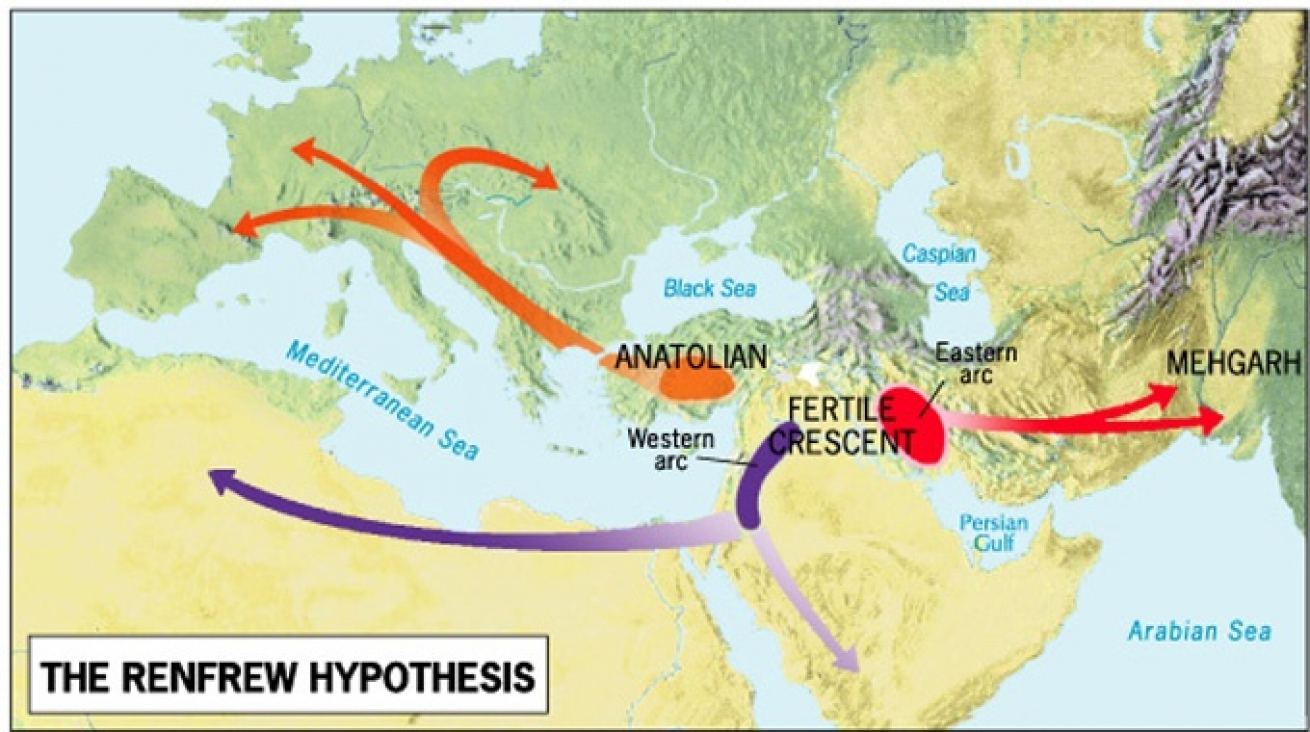 Colin Renfrew's theory on the dispersion of Indo-European languages.
Colin Renfrew's theory on the dispersion of Indo-European languages.
Greeks: to where and from where? An archaeological and interdisciplinary search in space and time (Έλληνες: ποῖ δὴ καὶ πόθεν; Μια αρχαιολογική και διεπιστημονική αναζήτηση στο χώρο και το χρόνο)
Theodoros G. Giannopoulos
16 October - 18 December 2018, 10 lectures of two hours each, 20 hours total
Every Tuesday, 18:00-20:00
Τhe seminar will be held at the premises of the City Unity College (Syntagma, Thiseos 15-17, second floor, hall 203)
Tuition fees: 100-125 Euros
The seminar is organised in collaboration with Aegeus - Society for Aegean Prehistory (www.aegeussociety.org). It will be in Greek and it is addressed both to archaeologists and to the wider public.
Overview (in Greek)
Στο σεμινάριο αυτό των δέκα θεματικών ενοτήτων εξετάζεται το «από πού» (πόθεν) και το «προς πού» (ποῖ δὴ) των Ελλήνων υπό ένα διαχρονικό και διεπιστημονικό πρίσμα. Τον κορμό της αφήγησης αποτελεί η παρουσίαση των πιο πρόσφατων επιστημονικών εξελίξεων για την προέλευση του ελληνικού πολιτισμού μέσα από το σχετικό ερευνητικό έργο του ομιλητή. Παράλληλα, η αναζήτηση της προέλευσης συνδυάζεται και με την εξέταση ορισμένων σημαντικών θεωρητικών ζητημάτων σε σχέση με την ελληνική πολιτισμική ταυτότητα σε διαχρονικό και συγχρονικό επίπεδο. Αξιοποιώντας συνδυαστικά ένα ευρύ φάσμα προσεγγίσεων από τον χώρο της αρχαιολογίας, της ιστορίας, της γλωσσολογίας, καθώς και της πολιτισμικής ανθρωπολογίας, γίνεται προσπάθεια να τεθεί μια νέα βάση για την κατανόηση όχι μόνο συγκεκριμένων πτυχών του παρελθόντος, αλλά και ορισμένων κρίσιμων παραμέτρων του αβέβαιου ελληνικού παρόντος.
Το σεμινάριο αποτελεί την πολλαπλώς εμπλουτισμένη και επικαιροποιημένη εκδοχή ενός επιτυχημένου, ομότιτλου κύκλου διαλέξεων που είχε δώσει ο ομιλητής το 2014.
Structure (in Greek)
- 1η διάλεξη: Μια εισαγωγή στη θεωρητική μελέτη των κοινωνιών.
- 2η διάλεξη: Έλληνες: γλώσσα, έθνος, «φυλή». Θεωρητικές προσεγγίσεις της ταυτότητας.
- 3η διάλεξη: Αναζητώντας τις ρίζες της ελληνικής γλώσσας: το ινδοευρωπαϊκό πρόβλημα και οι αρχαίες παραδόσεις.
- 4η διάλεξη: Το «προελληνικό υπόστρωμα», τα αρχαιότερα ίχνη της ελληνικής γλώσσας και οι προαλφαβητικές γραφές του Αιγαίου.
- 5η διάλεξη: Η «έλευση των Ελλήνων» στην Εποχή του Χαλκού; Η περίοδος των Καθέτων Λακκοειδών Τάφων (18ος – 16ος αι. π.Χ.) και η ύστερη 3η χιλιετία π.Χ.
- 6η διάλεξη: Το παρελθόν του παρελθόντος: το χρονικό βάθος των μυθολογικών παραδόσεων και η «έλευση των Ελλήνων» στα τέλη της 4ης χιλιετίας π.Χ.
- 7η διάλεξη: Το νεολιθικό χρονικό παράθυρο για την διασπορά των ινδοευρωπαϊκών γλωσσών.
- 8η διάλεξη: Το παλαιολιθικό χρονικό παράθυρο για την διασπορά των ινδοευρωπαϊκών γλωσσών.
- 9η διάλεξη: Πληθυσμιακή γενετική και προϊστορική έρευνα: μια αμφιλεγόμενη σχέση.
- 10η διάλεξη: Η καταγωγή των (Νεο)ελλήνων: η δύσκολη πορεία από την ιστορία στην ανθρωπολογία.
Theodoros G. Giannopoulos - Short CV
Theodoros G. Giannopoulos was born in Thessaloniki in 1979 and grew up in Patras. He graduated from the Department of History, Archaeology and History of Art of the University of Athens (2000) and received his PhD degree in Prehistory and Protohistory from the University of Heidelberg (2007). His Phd thesis entitled The Last Elite of the Mycenaean World. Achaea in the Mycenaean Age and the Phenomenon of Warrior Burials in the 12th-11th Century B.C. was published in 2008 in German (Dr. Rudolf Habelt, Bonn). Upon completion of the Phd he turned to the post-doctoral research, the product of which was the monograph „The Greeks: Whence and When?“ The Mainstream Scientific Responses and the Present State of Research on the First Beginning of the Greek Civilization (Crete University Press, Herakleion 2012, 2013 Award of the Greek Academy of Sciences). The book was very positively received by the scientific community, the broader readership and the Greek media. Theodoros Giannopoulos is currently working as an Adjunct Tutor and Module Coordinator in the Programme of Study “Studies in Hellenic Culture” at the Open University of Cyprus, while he is actively engaged in research, writing and translation work. His research interests include the Aegean Bronze Age, the Indo-European problem and the prehistory of languages as well as aspects of archaeological theory, epistemology and cultural anthropology of past and present societies.
Selected bibliography
- Braudel, F. 1996. Γραμματική των πολιτισμών, μτφρ. Ά. Αλεξάκης, Αθήνα: Μορφωτικό Ίδρυμα Εθνικής Τραπέζης.
- Γιαννόπουλος, Θ. Γ. 2012. «Πόθεν και πότε οι Έλληνες;» Οι υπεύθυνες απαντήσεις της επιστήμης και η παρούσα κατάσταση της έρευνας για την πρώτη αρχή του ελληνικού πολιτισμού, Ηράκλειο: Πανεπιστημιακές Εκδόσεις Κρήτης.
- Cuche, D. 2001. H έννοια της κουλτούρας στις κοινωνικές επιστήμες, μτφρ. Φ. Σιατίστας, Αθήνα: Τυπωθήτω.
- Drews, R. 1988. The Coming of the Greeks. Indo-European Conquests in the Aegean and the Near East, Princeton, New Jersey: Princeton University Press.
- Finkelberg, M. 2005. Greeks and Pre-Greeks. Aegean Prehistory and Greek Tradition, Cambridge: Cambridge University Press.
- Horrocks, G. 2010. Greek. A History of the Language and its Speakers, 2nd edition, Chichester: Wiley-Blackwell.
- Johnson, M. 2010. Archaeological Theory. An Introduction, 2η έκδοση, Malden – Oxford – Chichester: Wiley-Blackwell Publishing.
- Mallory, J. P. – D. Q. Adams. 2006. The Oxford introduction to Proto-Indo-European and the Proto-Indo-European world, Oxford-New York: Oxford University Press.
- Maran, J. 1998. Kulturwandel auf dem griechischen Festland und den Kykladen im späten 3. Jahrtausend v. Chr., Bonn: Dr. Rudolf Habelt.
- Renfrew, C. 1987. Archaeology and Language. The Puzzle of Indo-European Origins, London: Jonathan Cape.
Credits
Certificate (only for attending all the lessons of the seminar)
Venue - How to attend
Τhe seminar will be held in the center of Athens at the premises of the City Unity College (Syntagma, Thiseos 15-17, second floor, hall 203). The seminar may also be attended online via the internet.
Contact
Tel.: 210-6149103
Litous 1, Maroussi, 15124 Athens, Greece
Tuition fees
125 Euros (physical presence or online via the Internet)
100 Euros (physical presence or online via the Internet, for Aegeus members, unemploed archaeologists, students of archaeology)
A further discount of 10% for subscriptions until 5 October!
Individual attendance:
10 Euros (physical presence)
Payment methods
During the seminar or by bank transfer to the company's bank account
ALPHA BANK
Account: 157-00-2320-003924
IBAN: GR5601401570157002320003924
BIC: CRBAGRAAXXX
PIRAEUS BANK
Account: 6041144059085
IBAN: GR8401710410006041144059085
SWIFT-BIC: PIRBGRAA




